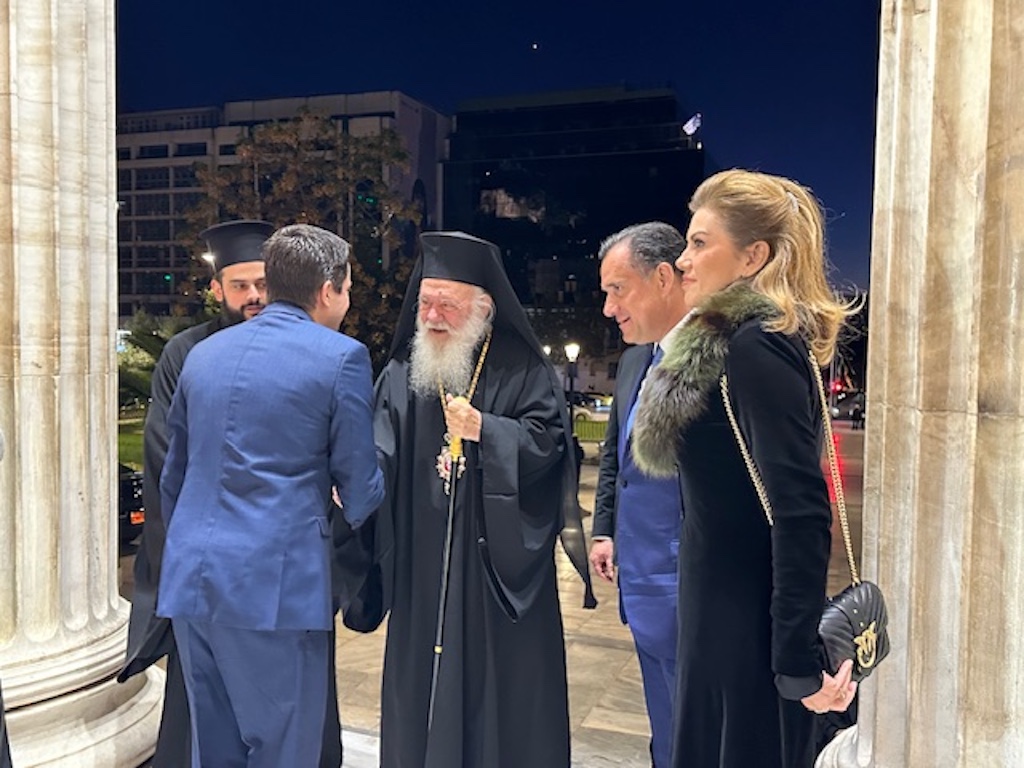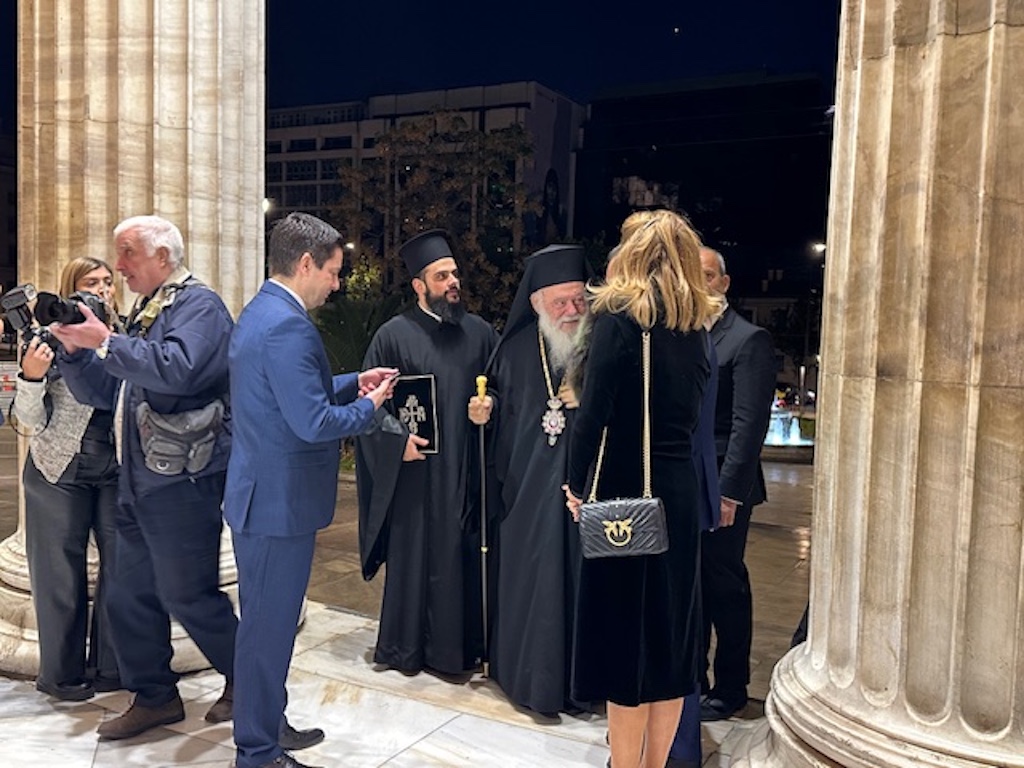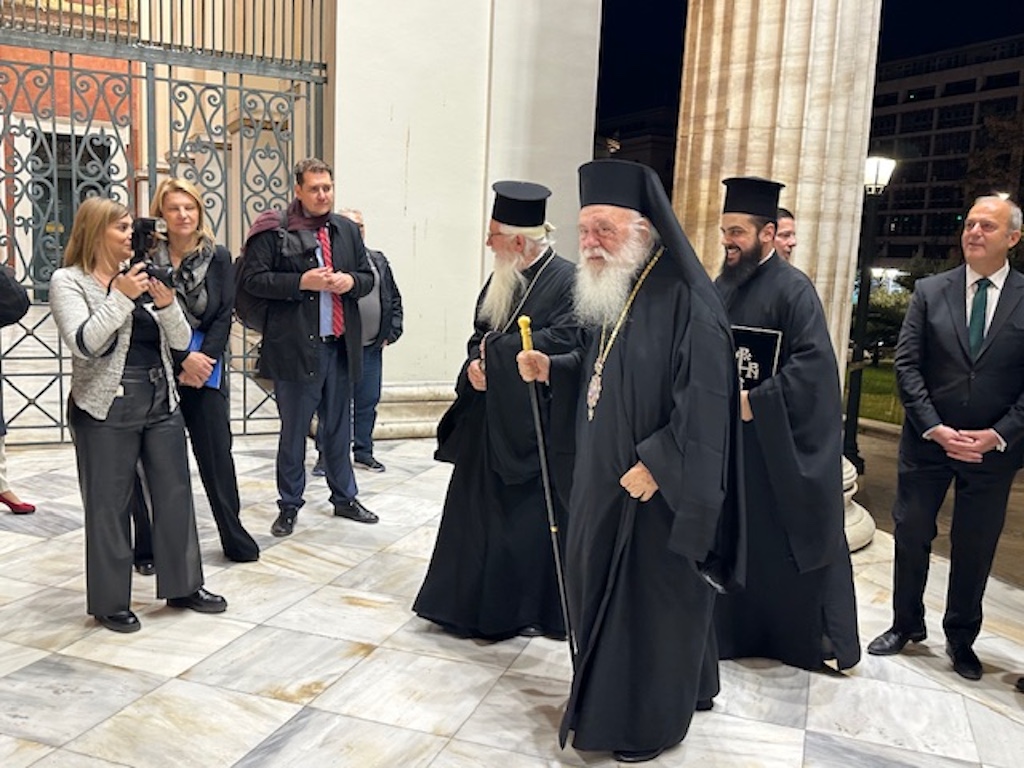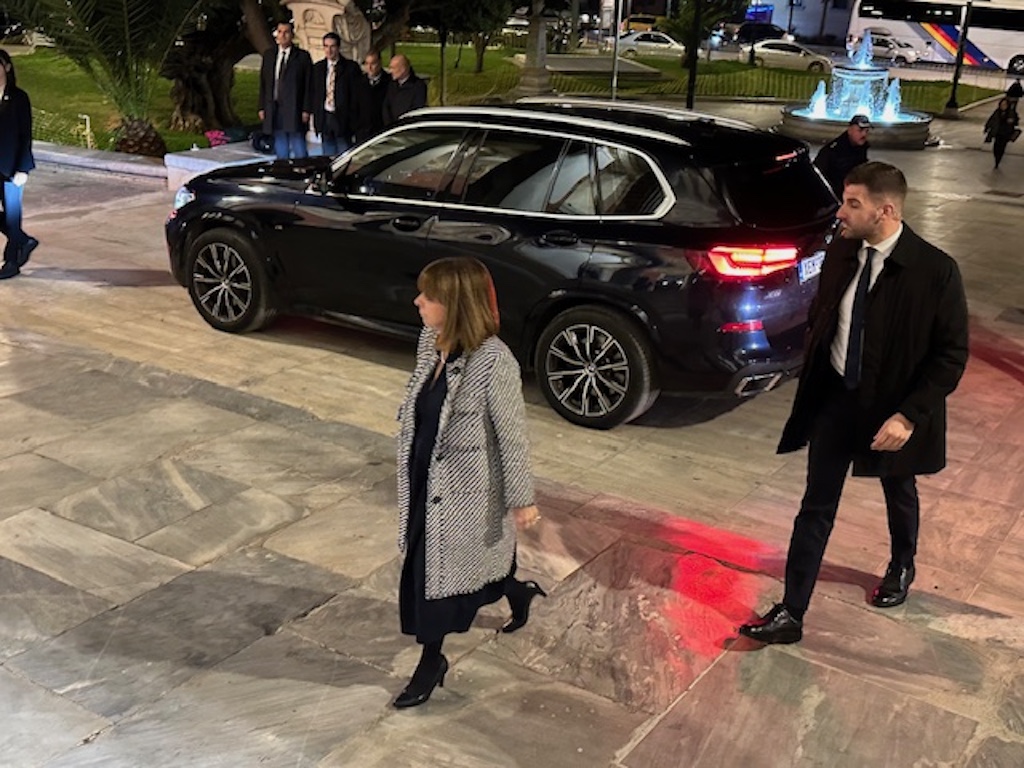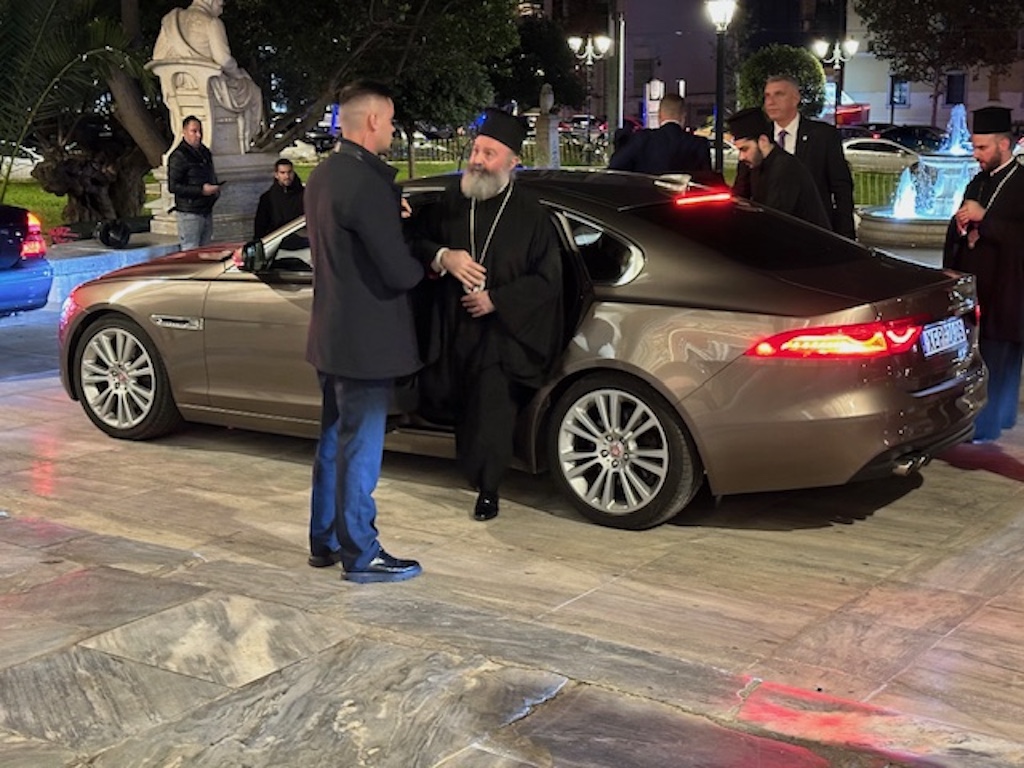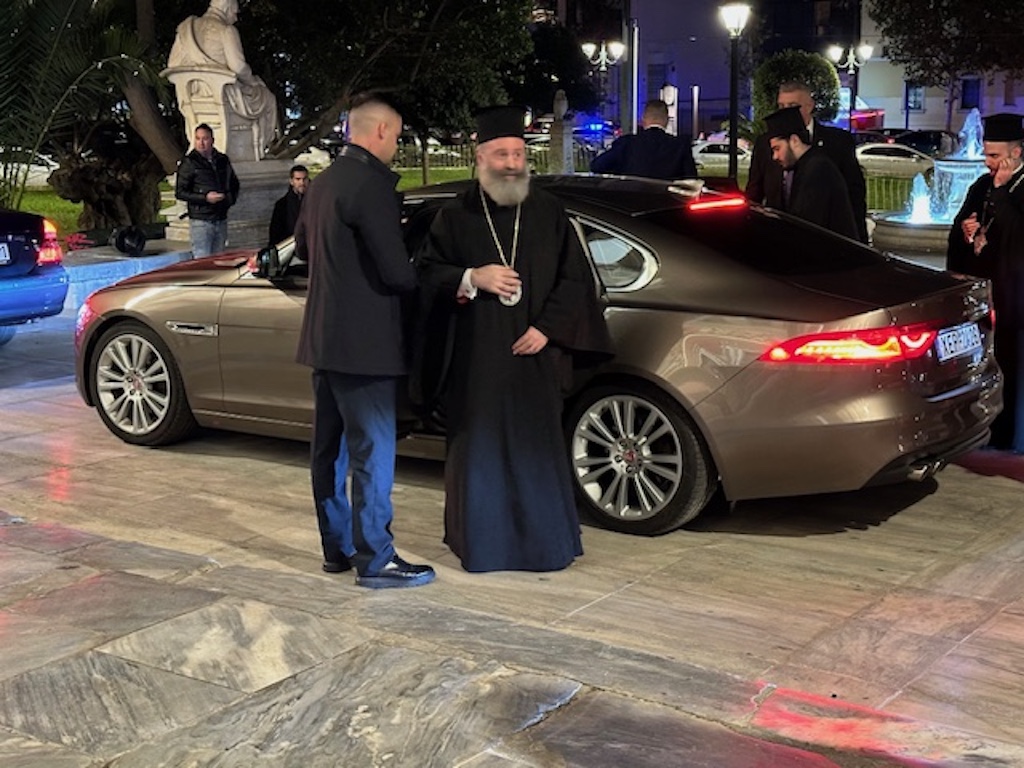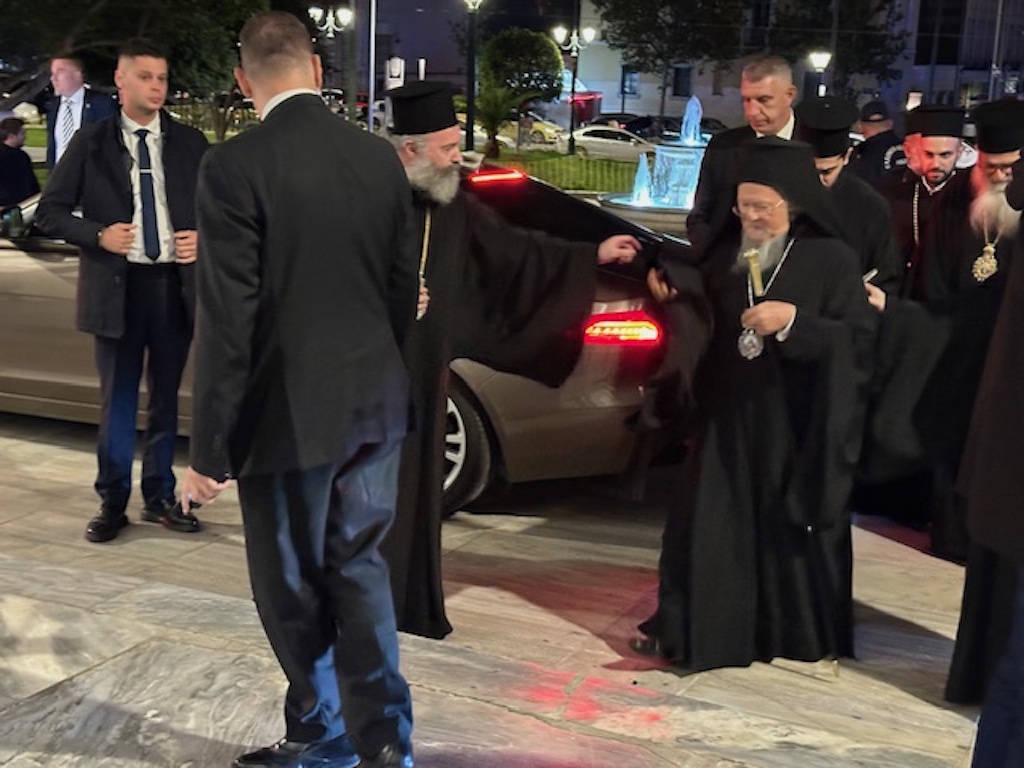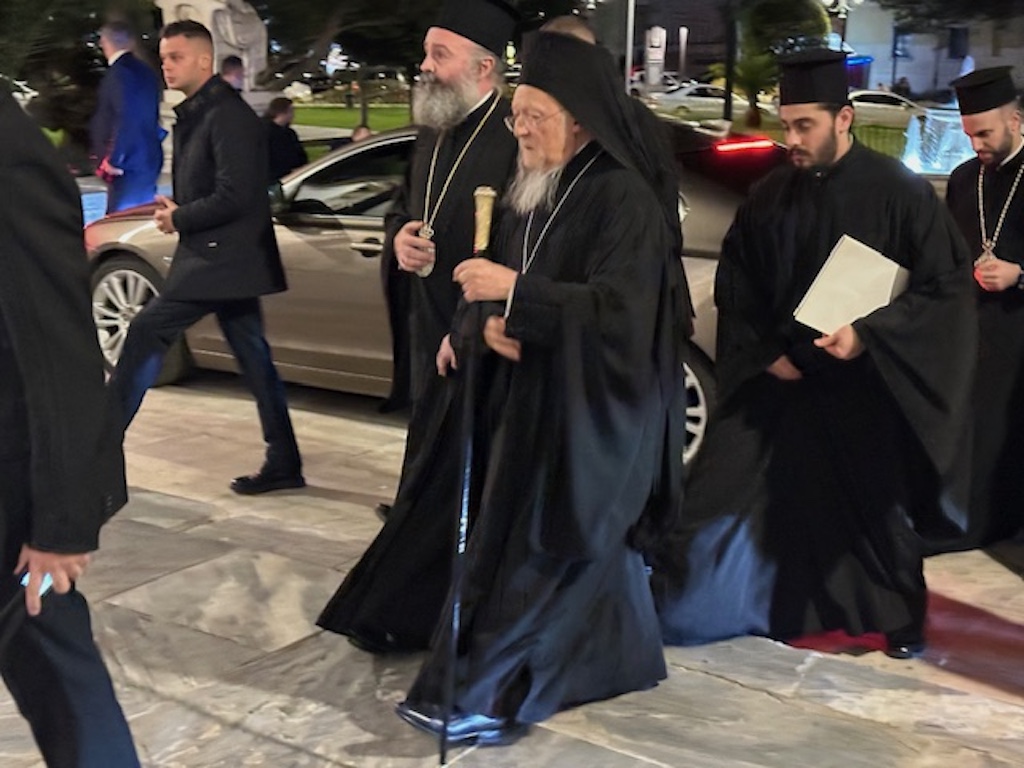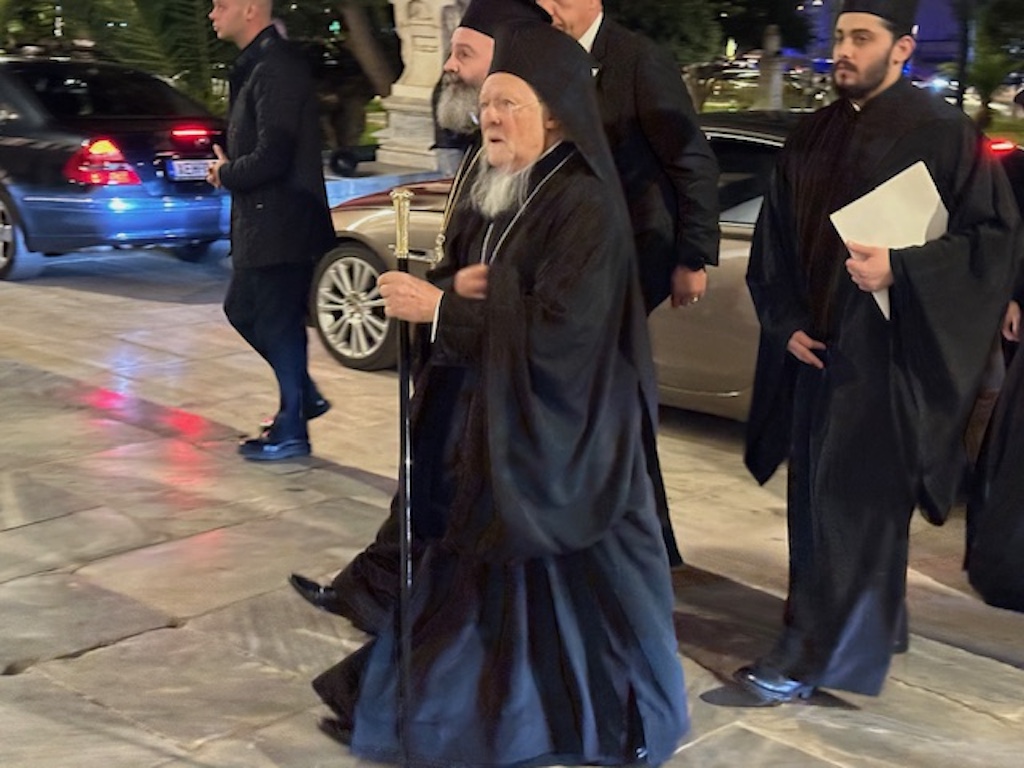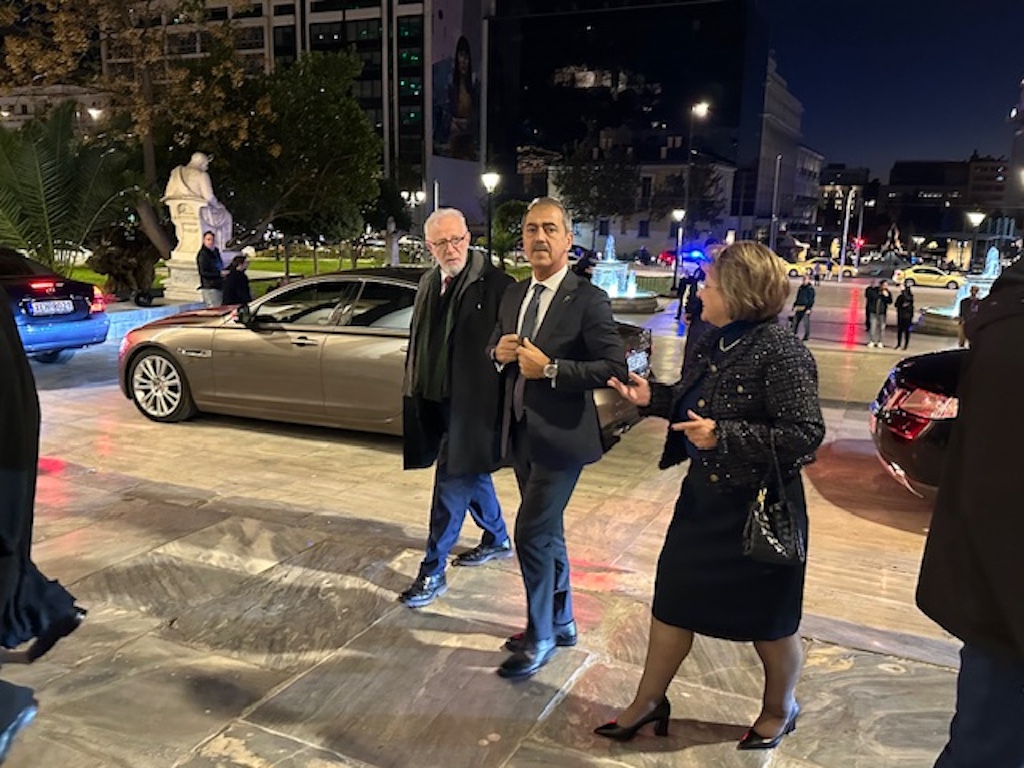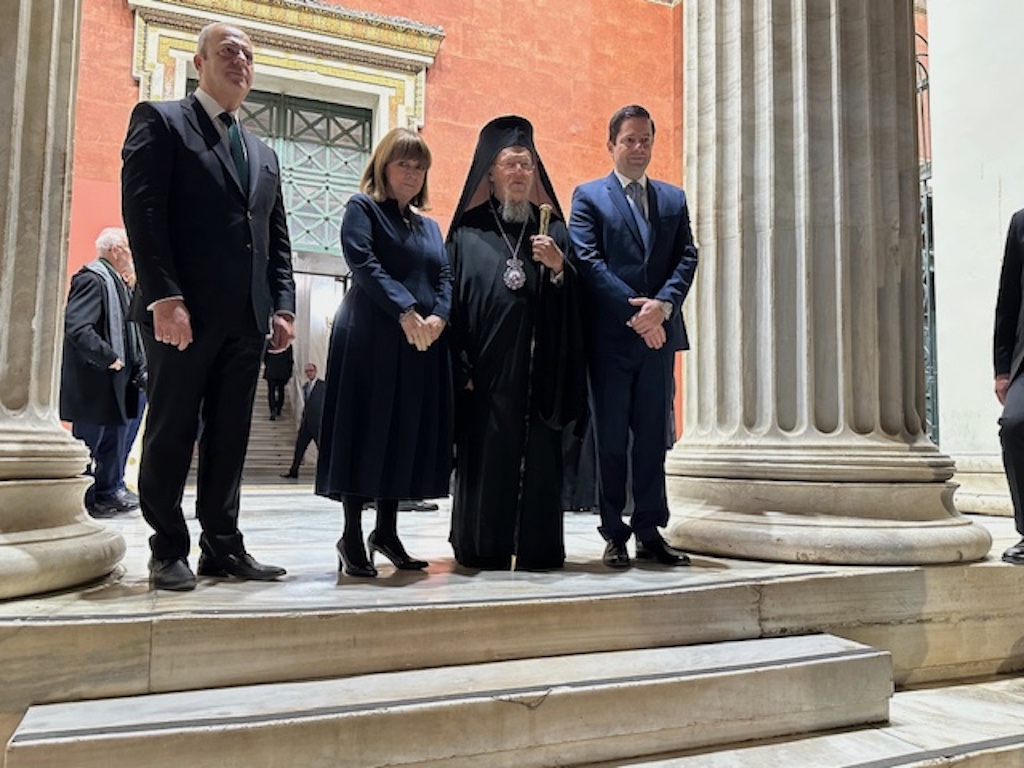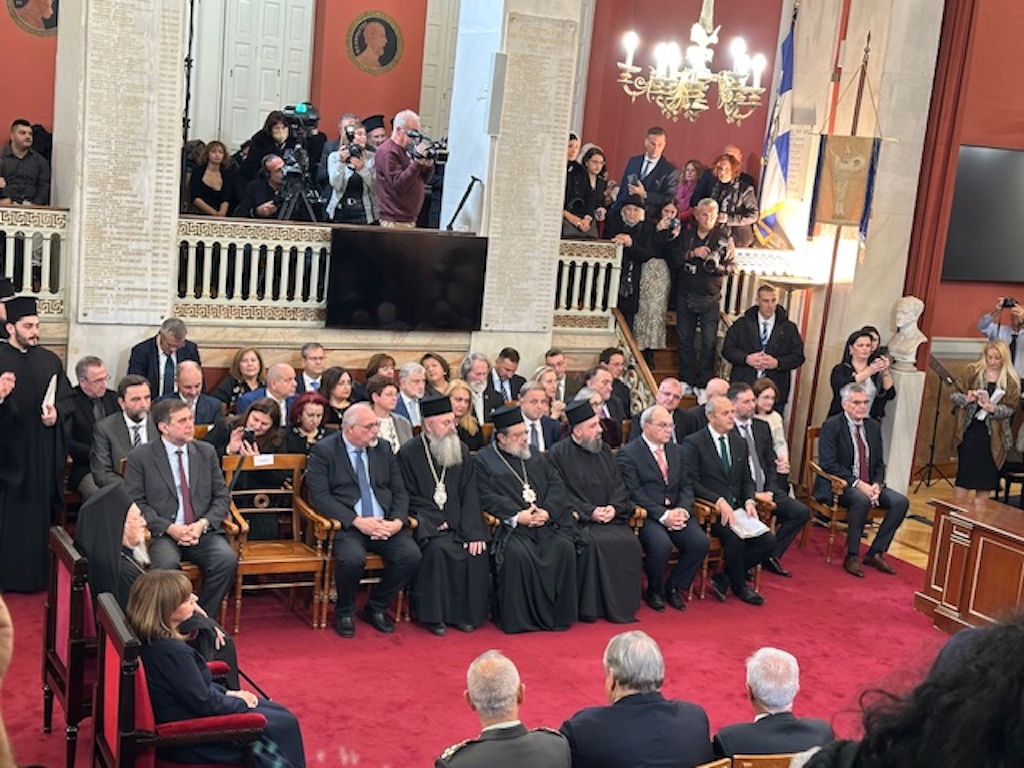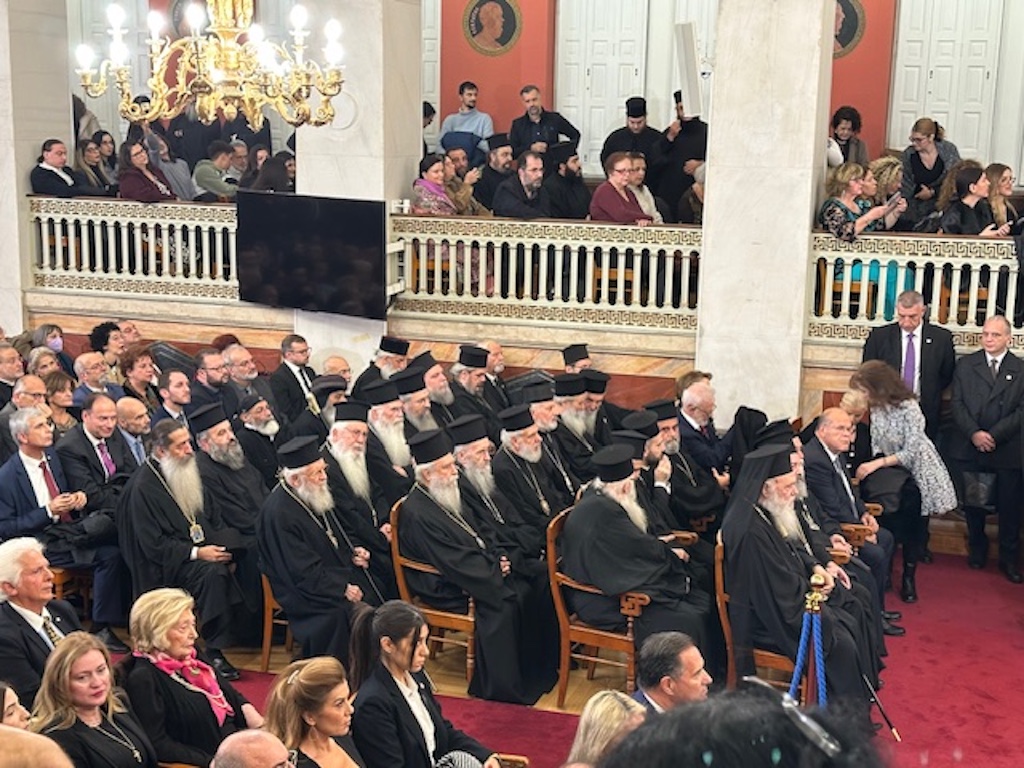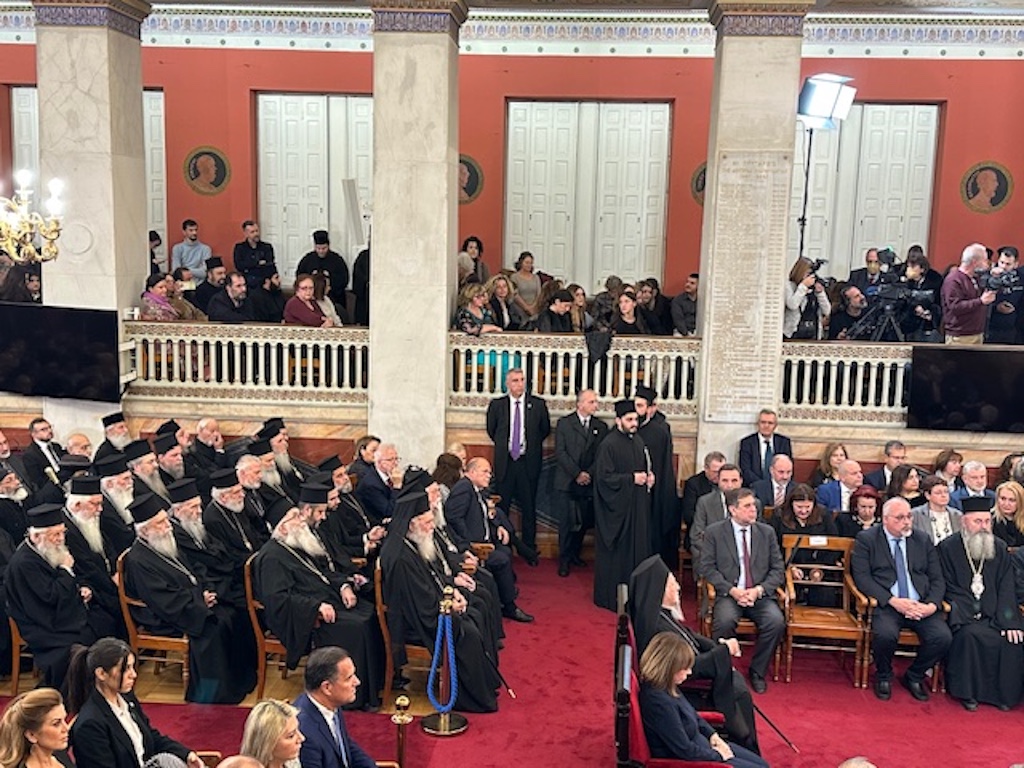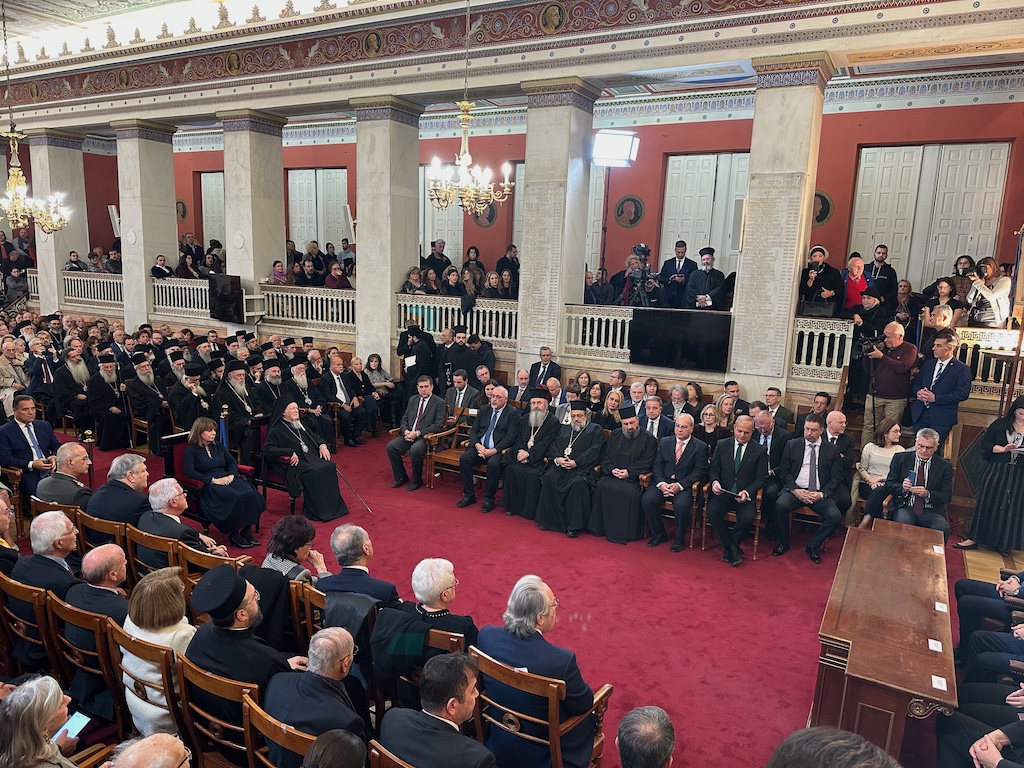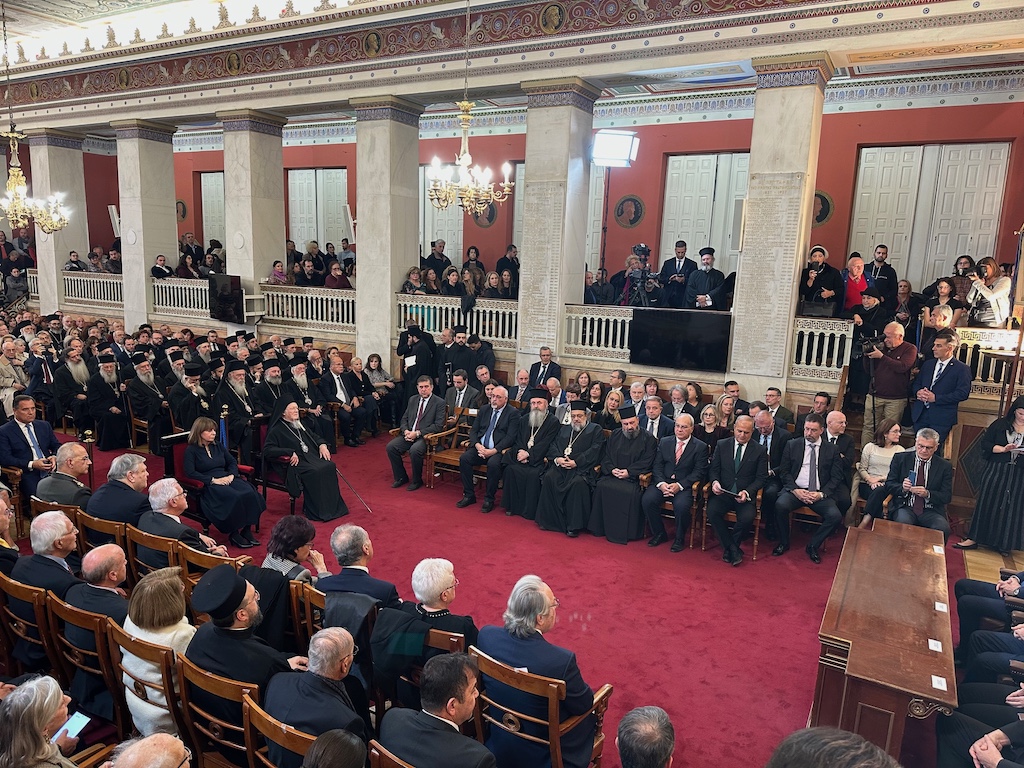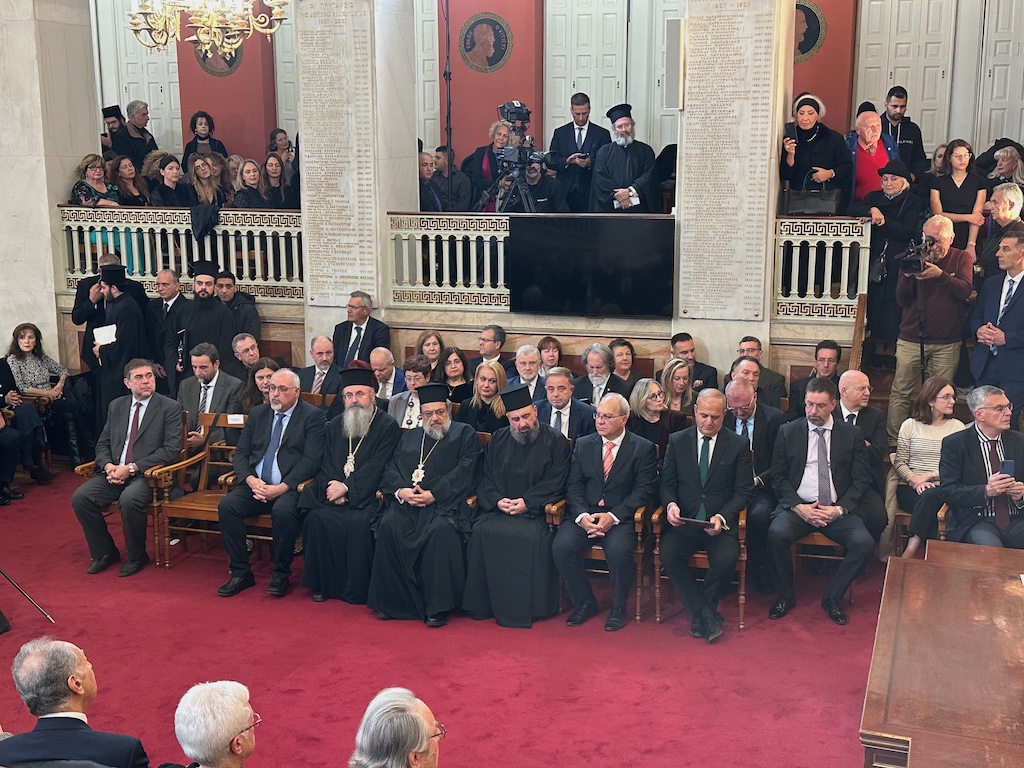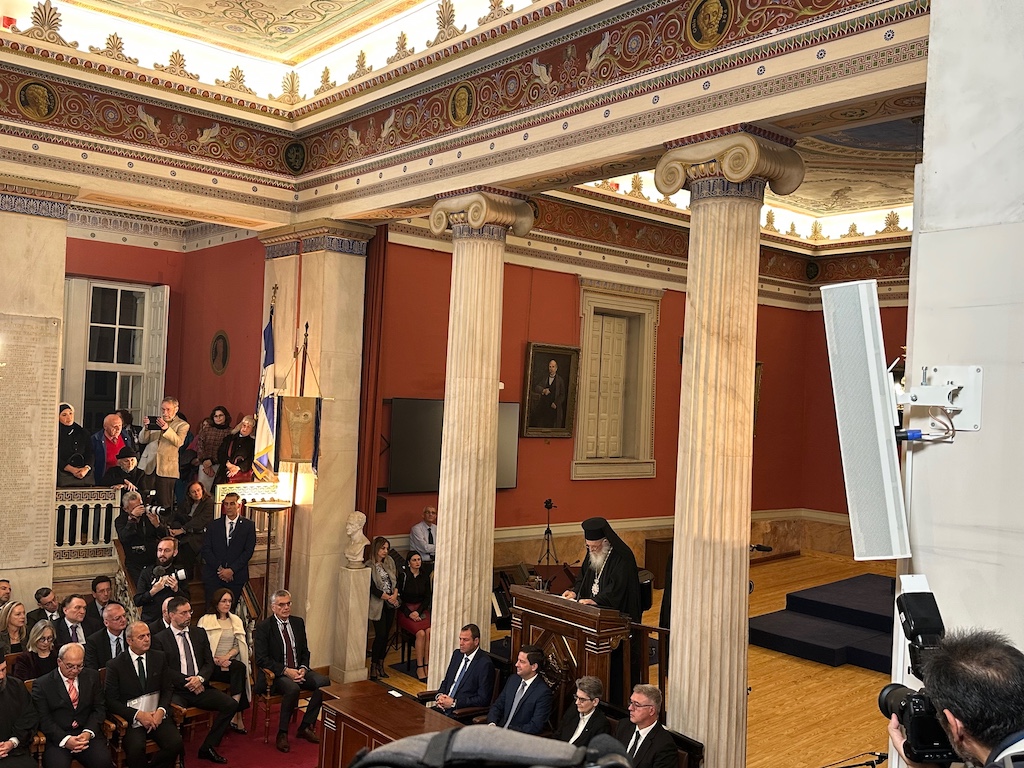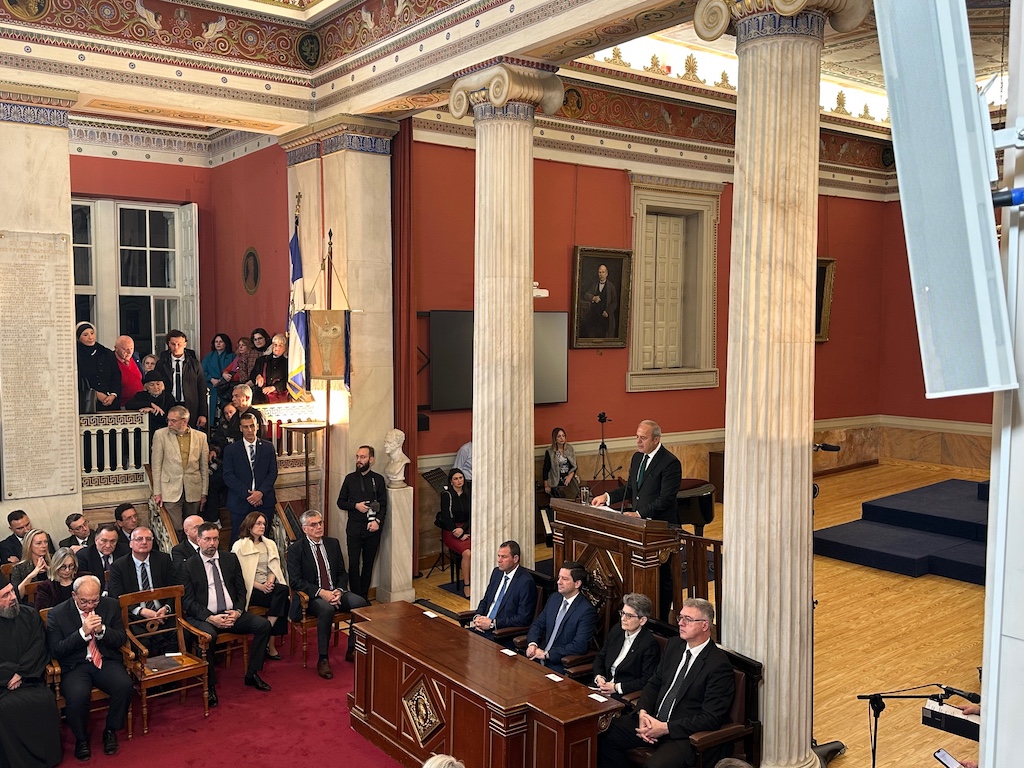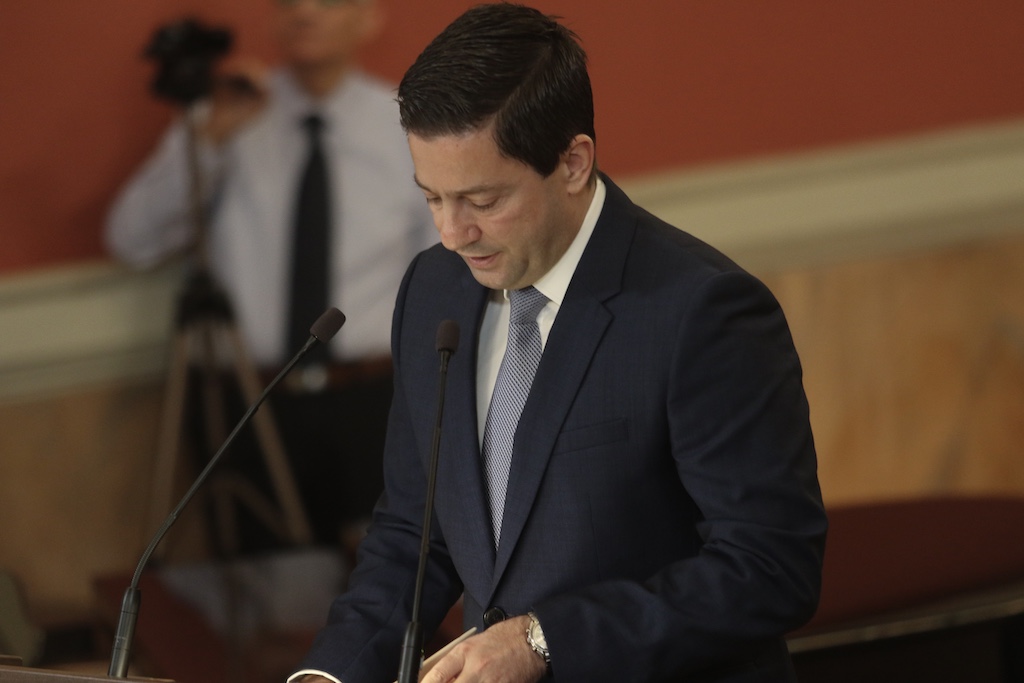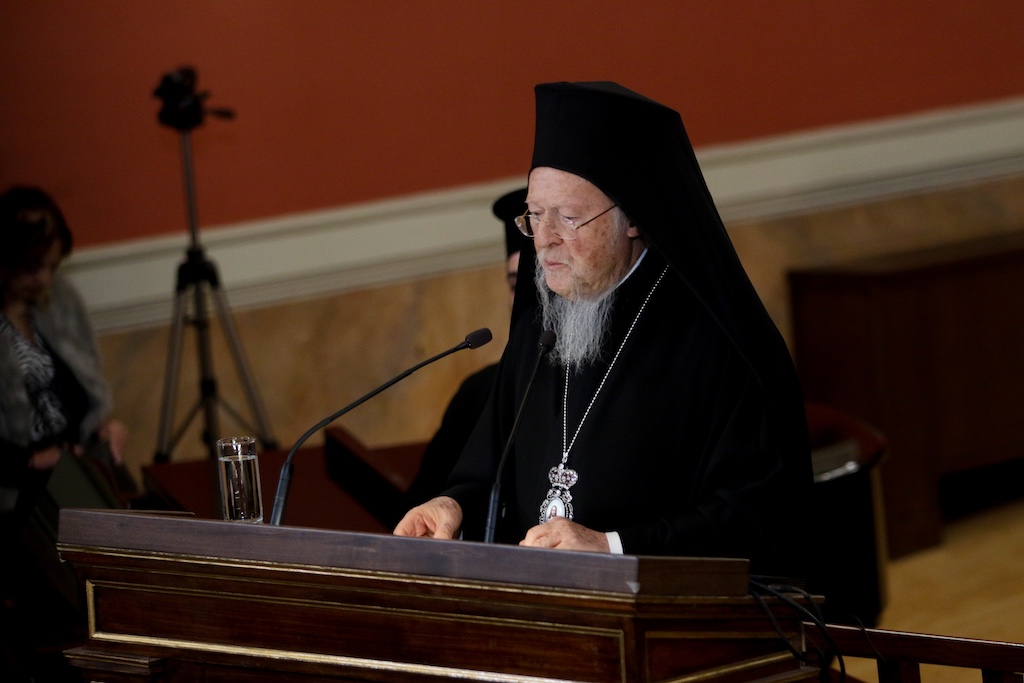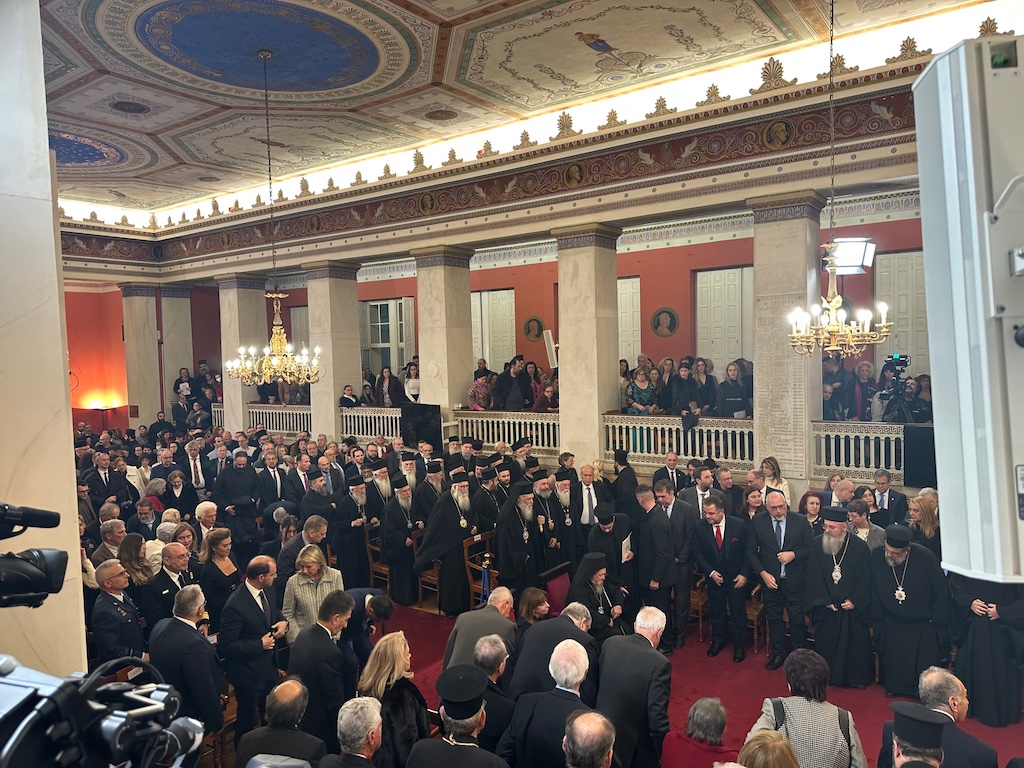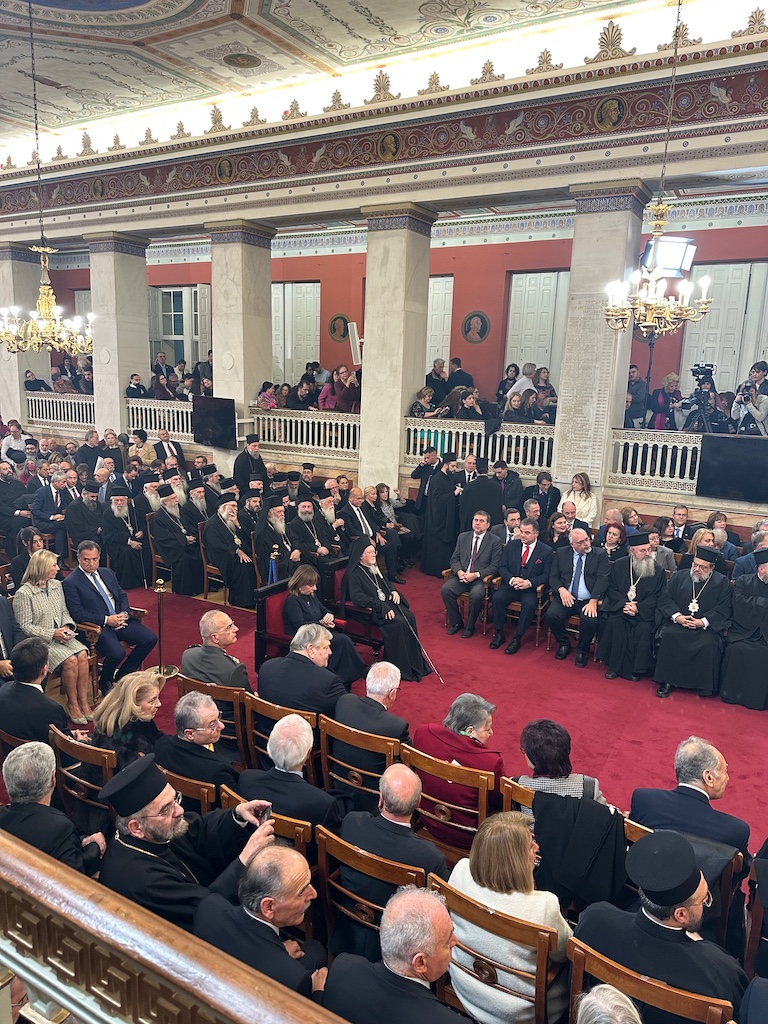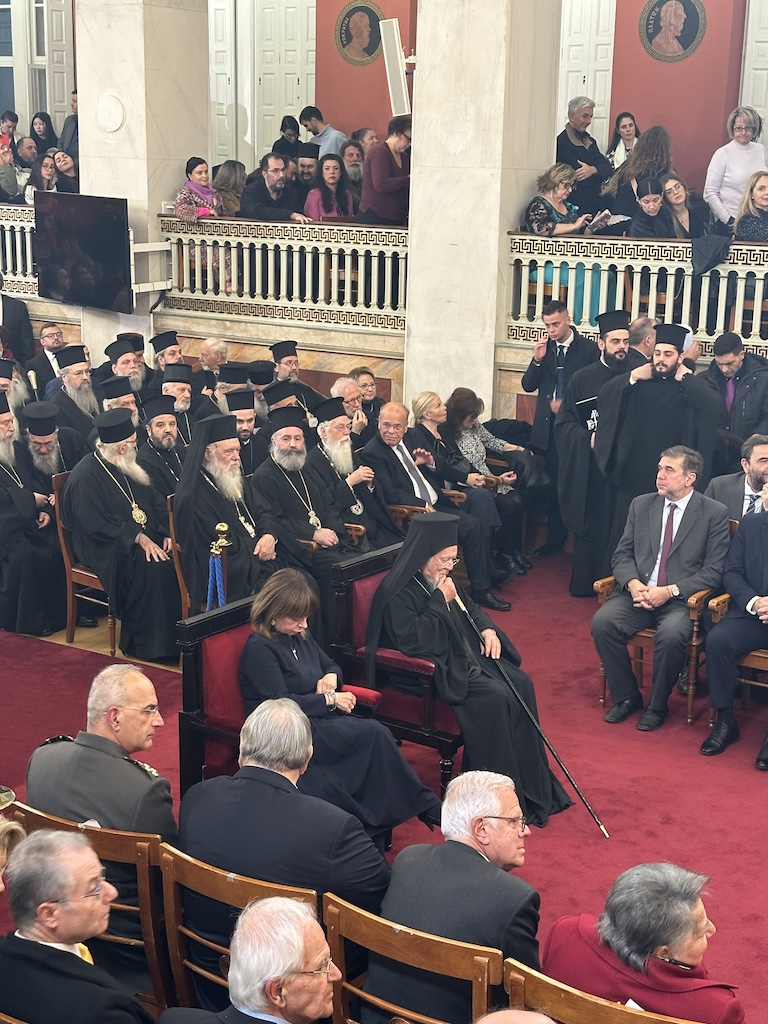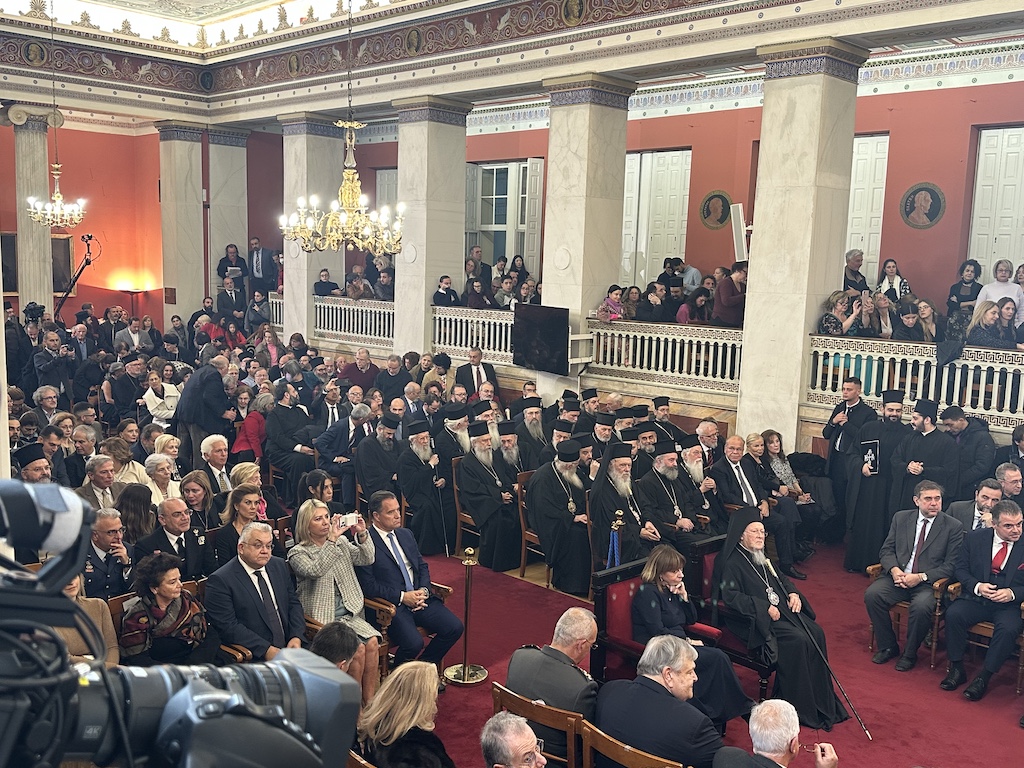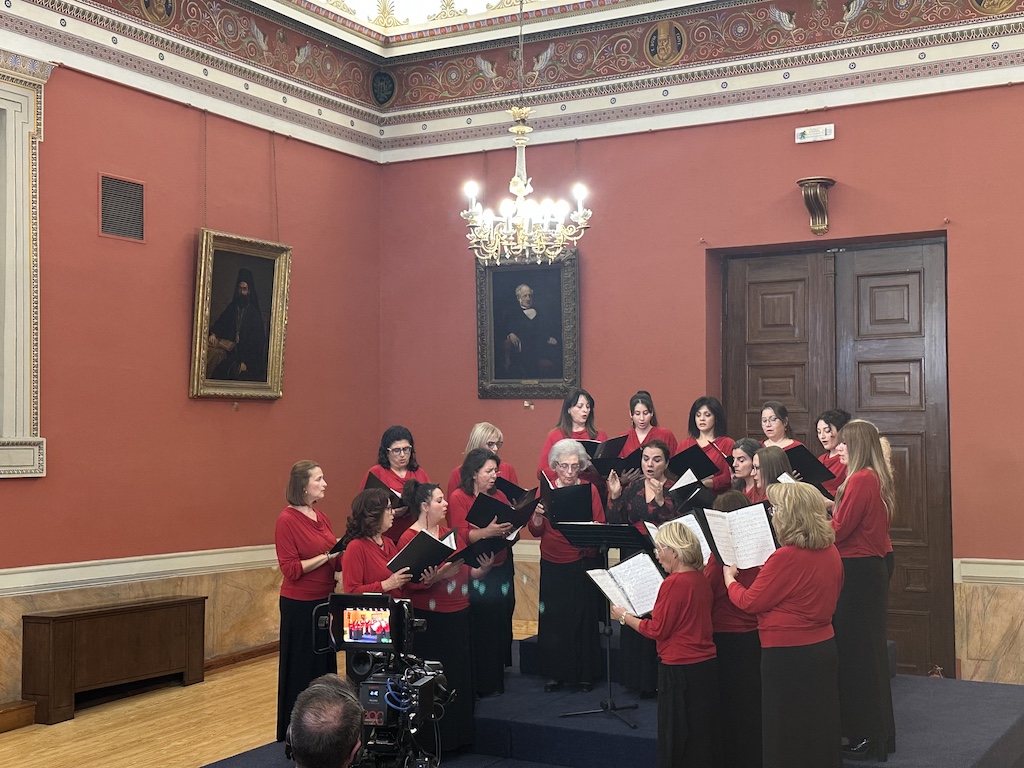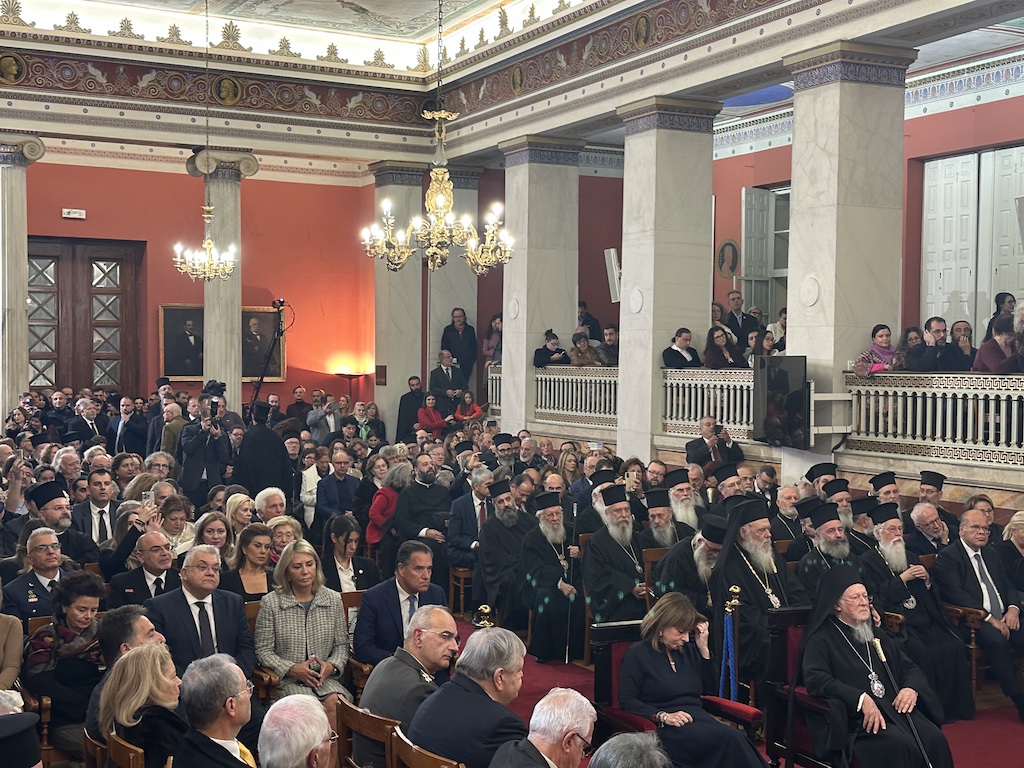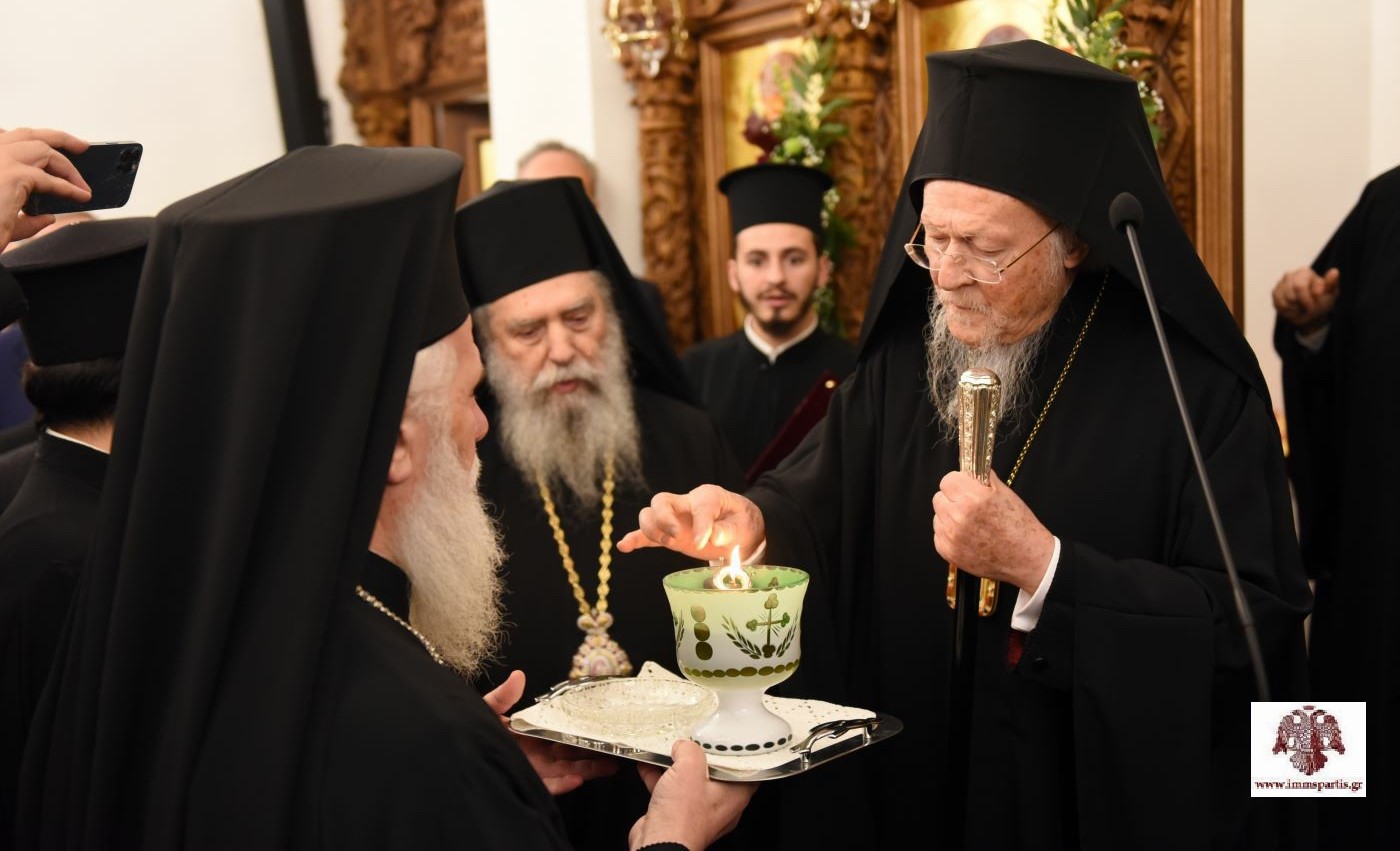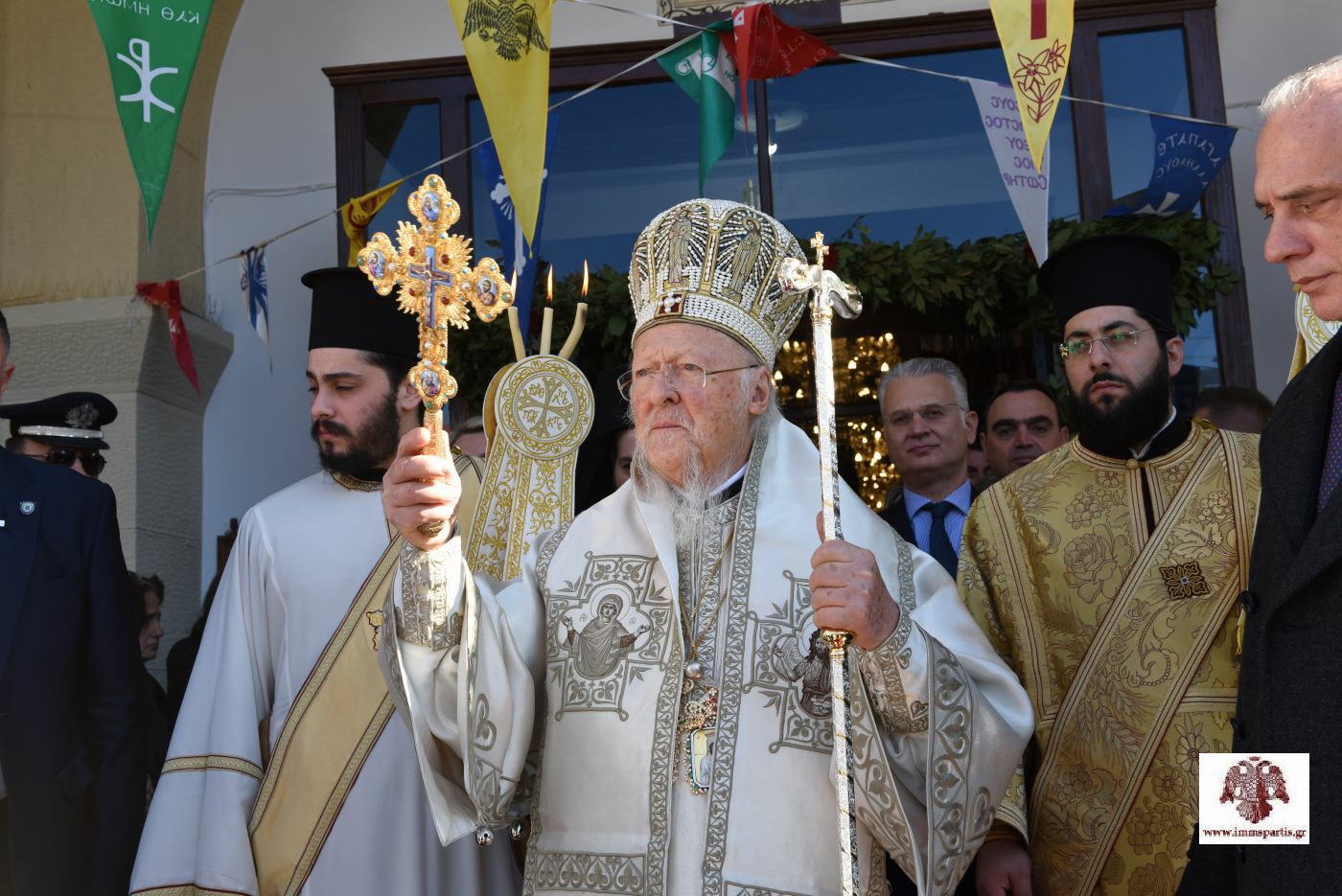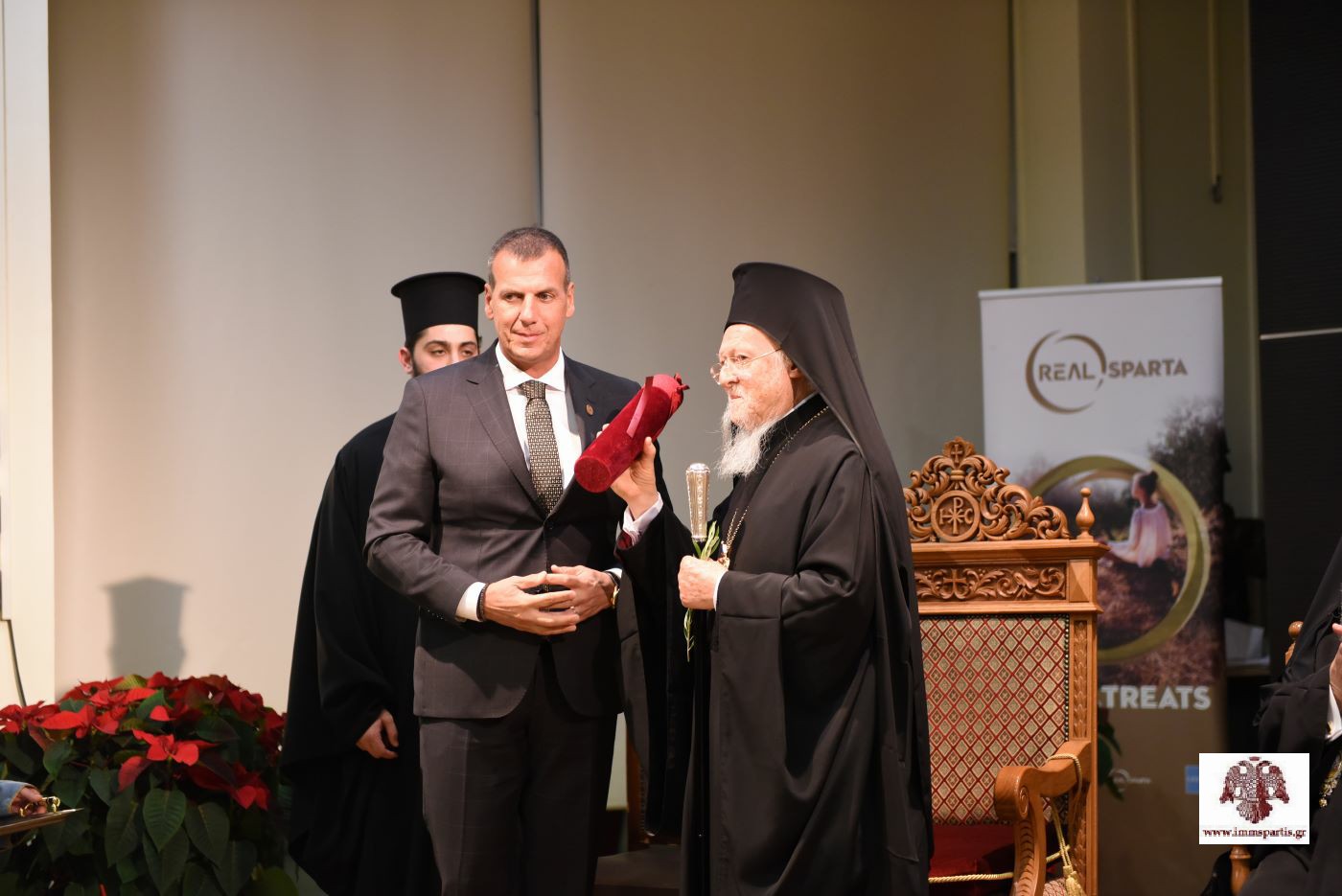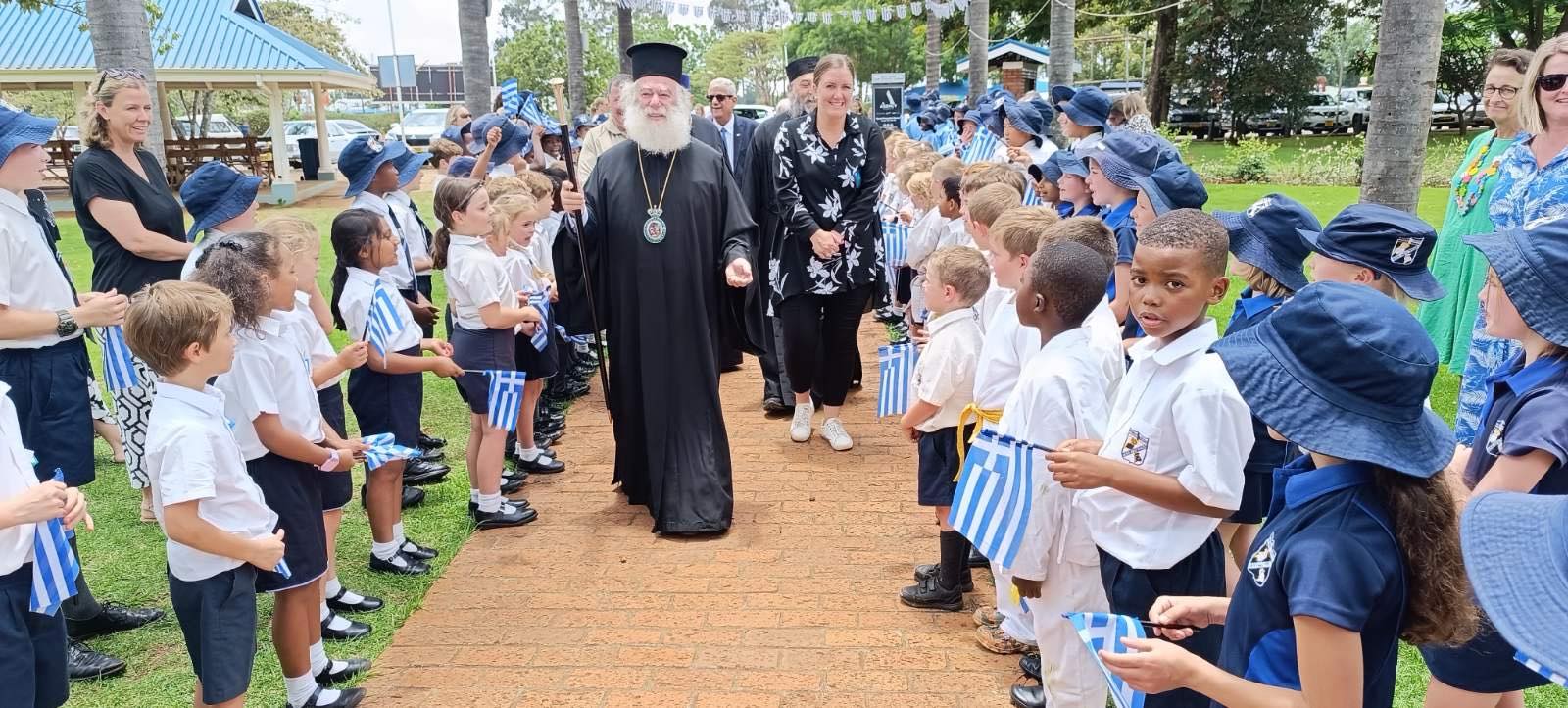Ecumenical Patriarch, Archbishop of Athens, and Metropolitans attend NKUA’s Theological Conference
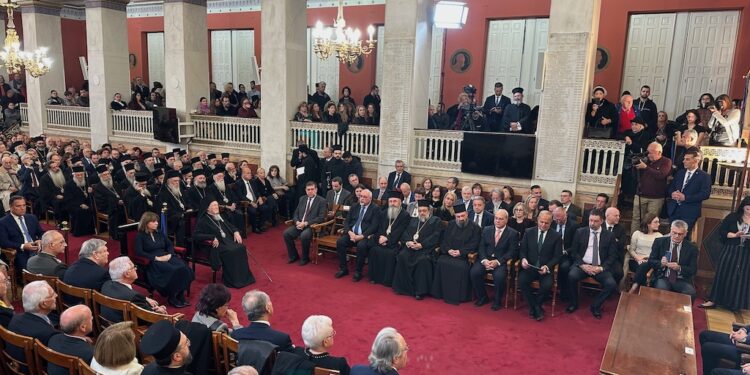

In the distinguished presence of His All-Holiness Ecumenical Patriarch Bartholomew and the President of the Hellenic Republic, Ms. Katerina Sakellaropoulou, the International Theological Conference titled “Orthodox Theology in the 21st Century – Challenges and Opportunities” was officially inaugurated.
The Conference, organised by the Theological School of the National and Kapodistrian University of Athens (NKUA) under the auspices of the Church of Greece, will run until 28 November 2024.
The opening ceremony took place on Sunday afternoon in the Great Hall of the University of Athens, which was filled to capacity with attendees, including students, clergy, and laity.
The Rector of the National and Kapodistrian University of Athens, Professor Gerasimos Siasos, warmly welcomed the audience, making special mention of the Ecumenical Patriarch, the Archbishop of Athens, and the President of the Republic.
In his address, Rector Siasos emphasised the historic partnership between the Church and the University, describing them as “cornerstones of Hellenism.” He highlighted that, for two centuries, many members of the ecclesiastical hierarchy have been alumni of the Theological School of the University of Athens. “The Theological School has supported not only the Church of Greece but also the Senior Patriarchates and the Greek Diaspora,” he noted.
Turning to His All-Holiness Ecumenical Patriarch Bartholomew, the Rector expressed gratitude, stating, “Your presence illuminates the Conference and strengthens the ties between the University and the Ecumenical Patriarchate.” He also underscored the significance of the event, remarking that it is only the third such Conference in the past 100 years.
He further emphasised the importance of the University of Athens in fostering the global role of Orthodoxy, highlighting the need to address contemporary challenges. “Our University becomes a living hub of pan-Orthodox dialogue,” he concluded.
His Beatitude Archbishop Ieronymos of Athens and All Greece then addressed the audience, emphasising the importance of theological schools fostering a dynamic and relevant theological discourse. He stated that this discourse should not only reflect on the teachings of the Church Fathers but also engage with contemporary issues.
“Theological discourse is always timely. The relationship between Theology and today’s world has a dual character: it can offer answers to the concerns of modern humanity while also being shaped by global upheavals, the climate crisis, and more. These challenges shake the foundations of what we have so far considered given,” noted Archbishop Ieronymos.
He further highlighted that new issues often stem from technological advancements and rapid progress. “Wars, refugees, inequality, and poverty have never ceased. Theological discourse cannot remain indifferent to these realities. Despite technological growth, a large portion of humanity continues to live under medieval conditions. The challenges faced by 21st-century humanity mirror those of the 16th century,” he remarked. He also pointed to the need for inter-Christian dialogue and advancements in pastoral theology. Concluding his speech, he expressed his support for the Conference, saying, “As the Church of Greece, we have supported this Conference under our auspices and wish the organisers every success.”
Dean Emmanuel Karageorgoudis of the Theological School followed, stressing the deep connection between Theology and society. He underscored the need for a reflective approach to theological education, moving beyond rote memorisation to foster genuine theological understanding.
“This is a dynamic process that involves the whole person. Every new piece of knowledge leads to deeper understanding and raises new questions. True theological knowledge requires an understanding of texts that allows prejudices to be overcome,” he explained.
In his remarks, Dean Karageorgoudis acknowledged the pivotal role of Ecumenical Patriarch Bartholomew in bringing attention to the climate crisis long before it became a global concern. “His presence at this Conference is more than an honour,” he noted.
“There is a theology that transcends words, revealed through ministry and the discreet exercise of ecclesiastical governance. It is like the mosaic pieces that form the whole of the Church. This theology is not confined to academic theory but transforms into a ministry of love and responsibility,” he added.
The Dean also elaborated on the structure of the Conference, which is divided into eight thematic cycles addressing the challenges of modern theology. “Theology is a living dialogue with God, humanity, and nature. Its theoretical knowledge arises from a process of internal contemplation. May this gathering transform into a Conference of Theology as Light,” he concluded.
His All-Holiness Ecumenical Patriarch Bartholomew then addressed the audience, reflecting on the necessity and opportunity for theology to communicate its message in a relevant and timely manner.
“Ecclesiastical theology cannot disregard the lived experiences of the Church’s members. Modern Christians do not inhabit the time of Christ, the Byzantine Empire, or the so-called ‘era of the Antichrist.’ Instead, they live in specific historical moments, across diverse cultural landscapes, confronting tangible problems and navigating the contradictions and opportunities of our era. It is to them that the Church and its theology must speak, functioning for the transformation of this world,” he remarked.
The Patriarch highlighted that in our era, the Church and theology face new realities and significant challenges, requiring an informed and perceptive engagement with contemporary historical conditions. “It is fundamental for theology not to adopt a defensive posture but to remain relevant. The present is not merely a chronological marker or ‘current events’—it encompasses time in its broader dimension,” he explained.
He identified two major challenges for theology today: the religious challenge and the new anthropology shaped by modernity’s cultural influences.
The Patriarch emphasised that no analysis of global issues or planning for the future can exclude the role of religions. “In light of the resurgence of non-Christian religions, it has been argued that the greatest challenge for Christianity today is no longer secularisation but the presence and engagement with these religions,” he stated.
He also noted the dual realities of religion in the modern world, observing that while violence in the name of religion persists, efforts toward interfaith cooperation and the promotion of religions’ peacemaking roles are also gaining ground. “The well-known slogan ‘No peace among peoples without peace among religions’ remains vital for humanity’s future. Religious partnerships are essential in addressing global issues, including ecological crises, migration, social and political conflicts, major natural disasters, and religious fundamentalism,” he added.
Turning to the challenge of anthropology in the context of modernity, Ecumenical Patriarch Bartholomew pointed out that anthropological issues increasingly impact inter-Christian relations and create tensions within individual Churches and Confessions. He emphasised the need for an “ecumenically accepted Christian anthropology.”
He stressed that while science and technology wield transformative power over our lives, they also present risks. “We must not overlook the dangers of ‘scientism’—the excessive reliance on scientific methods—as it can harm both humanity and the natural environment,” he warned.
As a key task of Christian theology, he advocated for resistance to religious fundamentalism and the promotion of shared humanitarian values across religious traditions.
The Ecumenical Patriarch called for sincere theological dialogue with the broader Christian world, noting that “throughout the Church’s history, introversion has never benefited its mission.” He emphasised the need for dynamic theologians with outstanding theological education, ecclesiastical ethos, and a deep awareness of contemporary realities.
“The Church must rely on devout and intelligent individuals who can discern the pulse of our time and convey the message of salvation in Christ,” he concluded.
Source: orthodoxtimes.com
